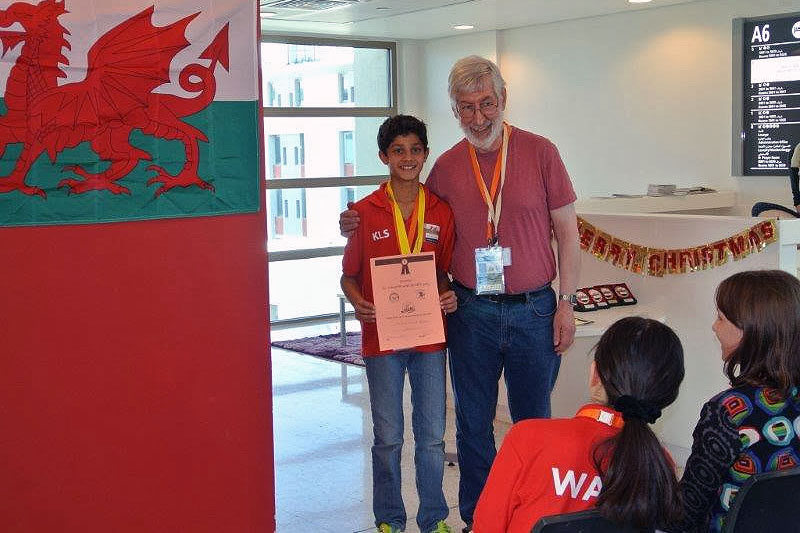A triple header
John writes:
I took early retirement as a Head of Maths at a comprehensive school in 2003, and since then chess has been my main occupation. Maths, chess and music often seem to go together and when I was younger, I was competent enough as both a violinist and classical guitar player to play occasionally in concerts at the local music club. My other big interest, coming originally from Bradford — I was at school with ex-British Champion George Botterill — is Rugby League.
In Wales, I do a lot of arbiting and achieved the FA title earlier this year, and am responsible for the Welsh Junior Rapidplay Ratings and its website. I also do some junior coaching.
Nearly all my chess playing is in team events and since Wales started entering teams in the European/World Seniors event I have been an ever present. It is my Welsh Seniors' team-mate Rudy Van Kemenade who you have featured twice in your column who has persuaded me to submit games.
The three games John sent are all from the current Welsh Correspondence Championship and he says:

I am a fledgling correspondence player with the games I sent being from my first event using a server — I flirted with postal chess many years ago, before computers were any good.
I am not sure whether they are really eligible since players are encouraged to use computers. This elevates the standard of play of even very weak players to possibly GM level, but we probably don't really appreciate the subtleties involved in trying to choose the best moves from a selection of good ones, and then there are also the clerical errors to avoid.
Also computers are still fallible as I found to my chagrin playing a Modern Benoni where neither Houdini 5 nor Komodo 11 could help me find a good plan while I was being mangled down the K-side. Both programs said I was perfectly OK until you made them look at my opponent's 'human' move h4 when the assessments rapidly changed to 'you are lost!' I still can't find where I went wrong in that game — which is below in case you find it better for your column than the Yeo–Thornton game which I believe deserves to be well known.
I'm happy to include both games and also of course his "Ecstasy" game. All three are, above all, good illustrations of our ambivalent relationship with chess engines. Once the tactics start in earnest, these are way beyond the capability even of top grandmasters but in the run up, it's very different as we have to apply our own understanding to pick sensible moves from a morass of information.
"Analysorrhea" is a very common problem when looking at games with engines and when I analyse myself or receive games from others, one of the most important actions is to prune the analysis down to a state in which it makes sense in human terms and to add sufficient written notes — which don't have to be detailed at all just clear — to make it all reasonably legible.
We start with his game with Paul Hatchett, in which the engines led John astray or at best in rather useless circles.
To switch games, click or tap the game in the list below the board!
Submit your games
Did you enjoy the column and instructive analysis by GM Jonathan Speelman? Do you wish you could have a world-renowned grandmaster analyzing your play? You can!
Just send in two of your games: one success story (Ecstasy) and one loss (Agony). Tell why you chose them, where or when they were played, and if they are selected, not only will you get free detailed commentary of your games by one of chess’s great authors and instructors, and former world no. 4 player, but you also win a free one-month ChessBase Premium Account!
At the airport, in the hotel or at home on your couch: with the new ChessBase you always have access to the whole ChessBase world: the new ChessBase video library, tactics server, opening training App, the live database with eight million games, Let’s Check and web access to playchess.com
A one-month Premium subscription to ChessBase Account means you get:
- Premium access to the Playchess server with ratings, simuls, lectures, and live commentary of top games
- Access to all Web apps with no restrictions, such as the Cloud database (MyGames.chessbase.com), and more!
- Full access to the Video archive, which not only includes all the past lectures by Daniel King, Simon Williams and others, but also a large number of full ChessBase products you would normally need to buy in the ChessBase Shop, but that you can view for free as a Premium subscriber.
See also:
























